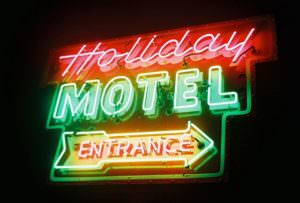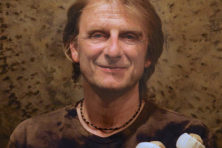From $300 to Studio 330
- Share
- Tweet
- Pin
- Share

When Hans Christian left Germany and arrived in America at age 21, he had $300 in his pocket and nowhere to sleep at night.
“I literally started with nothing,” he said.
“I barely spoke English.”
That was in 1977. Today, Christian owns and operates Studio 330, named for its location at 330 N. 3rd Ave. in Sturgeon Bay. He doubles as its recording engineer (the person who records live studio sessions) and producer (the technical leader of a given music project).
Although Christian lives in the upper story of his building, he’s very much at home in the studio itself. As I watched (somewhat intimidated), he switched seamlessly between directing his client of the day – Green Bay–based musician Jeff Miller, who was recording a Chuck Berry cover – and manipulating the vast array of buttons and switches on the soundboard in front of us. As he did so, he told me about his journey to America.
Music was the motivation behind the move because Christian wanted to attend Musicians Institute, an acclaimed music school just off of Hollywood Boulevard in Los Angeles.
It was a plan that his parents didn’t approve of – “they worried for years,” Christian said. But he said he had “this deep desire for adventure. I didn’t know what that [adventure] would be until I found this music school. Then I was hell bent on making it happen.”

So he made his way to L.A., arriving with the aforementioned $300, a bass and a cello. He stayed at the local YMCA until he had saved up enough money to rent an apartment and enroll in Musicians Institute. From there, he started playing gigs “from the grungiest, rattiest holes in Hollywood to the nicest clubs.”
But music was Christian’s passion long before his move to America. He still remembers when he started playing cello at age 9: “My first cello lesson was on January 20, 1970,” he told me.
“How do you remember that?” I asked. “I don’t even remember what I had for lunch yesterday.”
“Me neither,” Christian said with a laugh. “But this was important, so I remembered it.”
Settling Down in Sturge
While living in L.A., Christian quickly climbed the ranks of the music scene as both a cellist and a bassist. He worked with musicians such as Billy Idol and Robbie Robertson, performed on TV shows such as Solid Gold and American Bandstand, recorded with renowned producers such as Daniel Lanois and Anton Fier, and developed solo cello shows with theater director Scott Kelman.
In 1988, he set off on his first solo tour, which took him back to Germany, as well as to Holland. After returning to the United States, Christian decided to move to San Francisco and start up his first studio.
It wasn’t until 1989 that he had even heard of Door County. At that time, Fred Alley was planning to record an album with Christian, and the two became friends.
“I’d come to Door County to visit him, do concerts with him, and I started to love the area,” Christian said. And as he did, the difficulties of working in San Francisco – especially the high cost of living and the cutthroat competition in the music industry – started to become more obvious.
So in 2002, he made his second huge jump – after moving from Germany to L.A. – in moving from San Francisco to Sister Bay. After that came a far smaller move: transitioning from Sister Bay to Sturgeon Bay because his spot in Northern Door was a bit too quiet for him.
Sturgeon Bay might seem like an odd location for a recording studio, given that they’re much more common in larger cities. But in recent years, Christian has seen many more operations like his cropping up in rural areas.
To find success, these rural studios must be worth the drive out into the “boonies” – and according to Miller, Studio 330 is. That’s why he comes up to Door County to record rather than finding a studio closer to his Green Bay home base.
“There’s no one in Green Bay who is of his caliber and experience,” Miller said.
The studio draws in locals, too. One is Holly Olm, a musician who has watched Studio 330 find its niche in Door County over the years.
“The studio has gone from this small, intimate studio to what you would find in a professional setting anywhere,” Olm said. “It’s as good as it gets.”
Critics agree. Christian was nominated for Producer of the Year honors in the 2022 Josie Music Awards, and this year, he was nominated for Best Producer/Engineer of 2023 by the Wisconsin Area Music Industry.
“I’m good at what I do,” he said. “It might sound strange to say that, but I know I am.”
He paused, and Miller’s vocals filled the short silence. Miller had been working on the same segment of the song for what seemed to me like a long time.
“Does it ever drive you crazy, listening to the same part of the same song over and over?” I asked.

Photo by Rachel Lukas. 
Hans Christian. Photo by Rachel Lukas.
“This is nothing,” was Christian’s reply about the recording session, which had lasted “only” two and a half hours at that point. He’s done 12-hour stretches and even all-nighters in the past.
Christian sometimes listens to the same chunk of the same song 100 times before moving on, and to him, it sounds a bit different every time.
“It’s like when you build a house,” he said. “You’re doing it for a long period of time, but you’re not looking at the whole thing. You’re looking at the studs, the foundations. When I listen to a song, I listen to different things: the arrangement, the processing, the pitch, the editing.”
This attention to detail can make listening to other people’s music – or almost anything on the radio – difficult.
“It’s too much information for me,” Christian said. “I need silence or classical.”
Changing with the Times
You might assume that recording music takes up most of a recording studio owner’s time, but for Christian, that isn’t the case.
“This,” he told me, gesturing to the soundboard in front of him and the musician strumming his guitar behind it, “is 15% of what I do.”
“What’s the other 85%?” I asked.
Christian exhaled and started the list.

In addition to recording music, he uses his studio to produce radio spots for political candidates, teaches beginner audio-engineering classes through Northeast Wisconsin Technical College, and has recorded songs for charity, donating money to Ukraine as well as organizations such as the International Youth Music Project and Guitars for Vets.
He also makes time to work on his own music, collaborate with other artists and tackle studio-improvement projects. Last March, for example, he tore down all the equipment and cabling in the control room to make way for a new Audient ASP8024-HE recording console – an 800-pound beast that took five people to maneuver into the building.
Christian also opened a new studio room to the public in 2022. The room, dubbed “the sanctuary,” is stocked with its own recording system and what he calls “esoteric instruments,” including a harmonium, sarod, tambura, sarangi and psaltery.
His long list of projects make for a busy schedule – but one that’s necessary because making music doesn’t bring in as much money as it used to, he said. Among other factors, that’s because of the increased number of serious artists starting their own home recording studios and the rising popularity of music-streaming services such as Spotify.
“Instead of making $15 on a CD, people listen to the same 10 songs on Spotify and the artist makes, like, .00005 cents,” which comes back to bite the producer, too, Christian said.
But rather than drowning in this new wave of music, he has learned to swim.
“The traditional role of a recording studio – the traditional model – it won’t survive,” Christian said. “These days you have to do everything. You have to compose; you have to produce; you have to engineer.”



